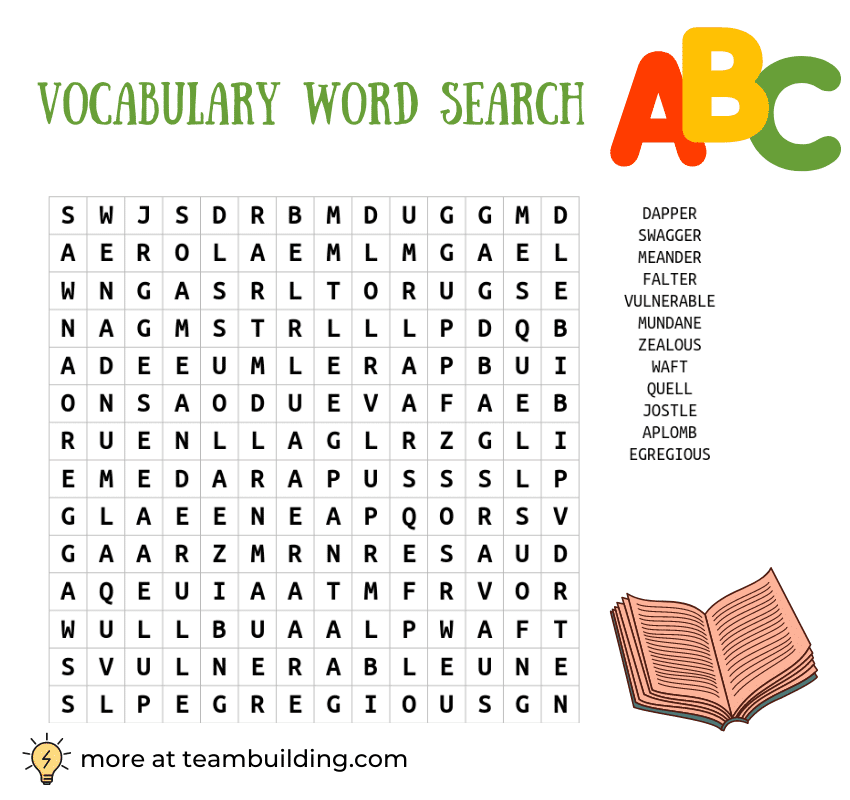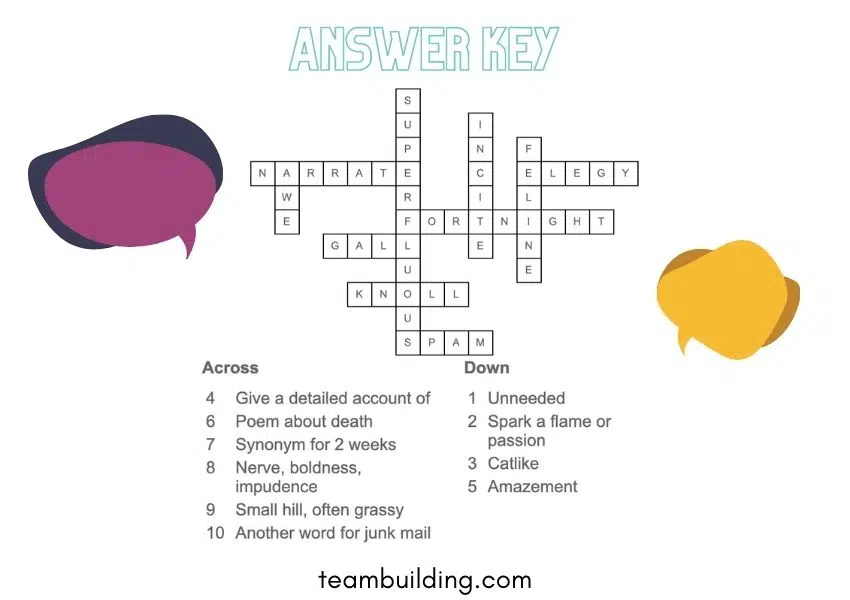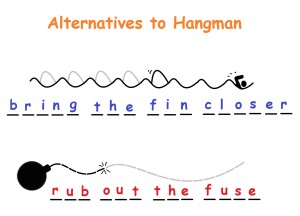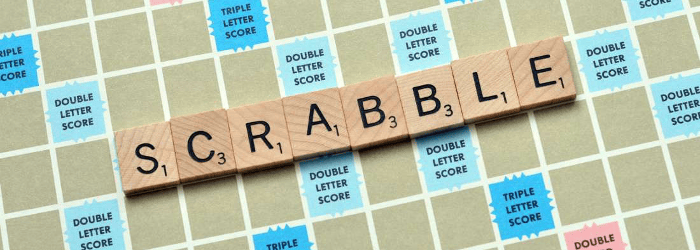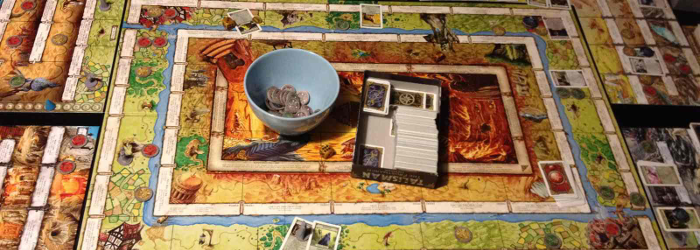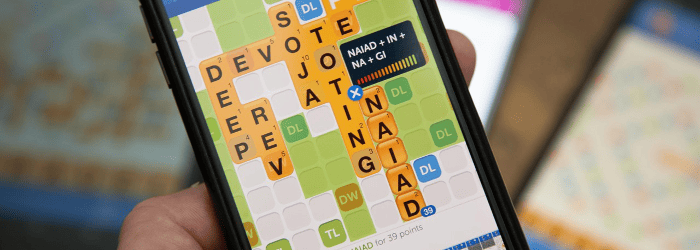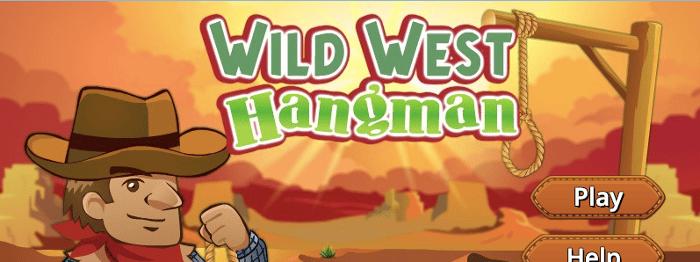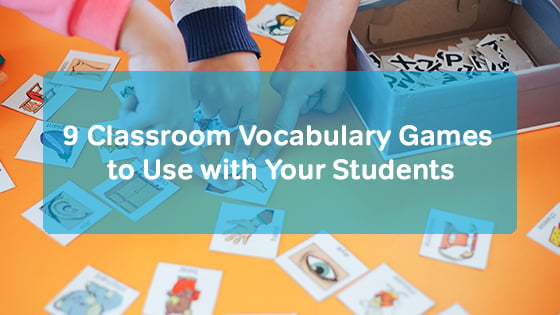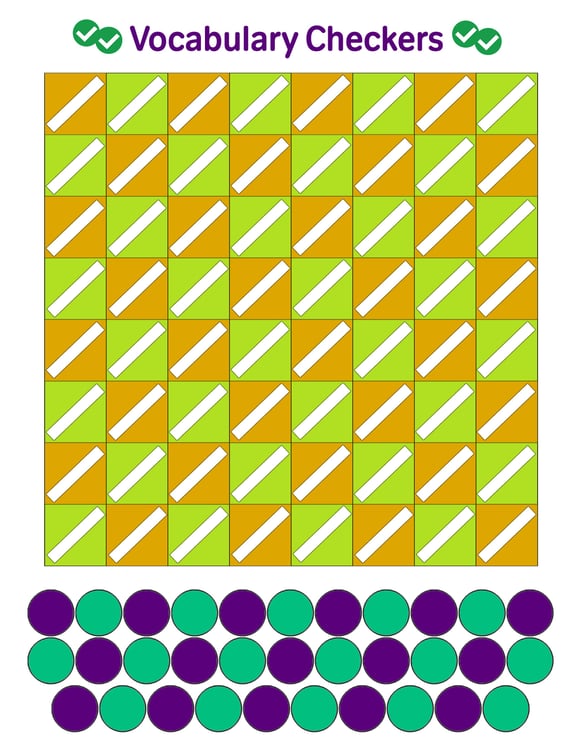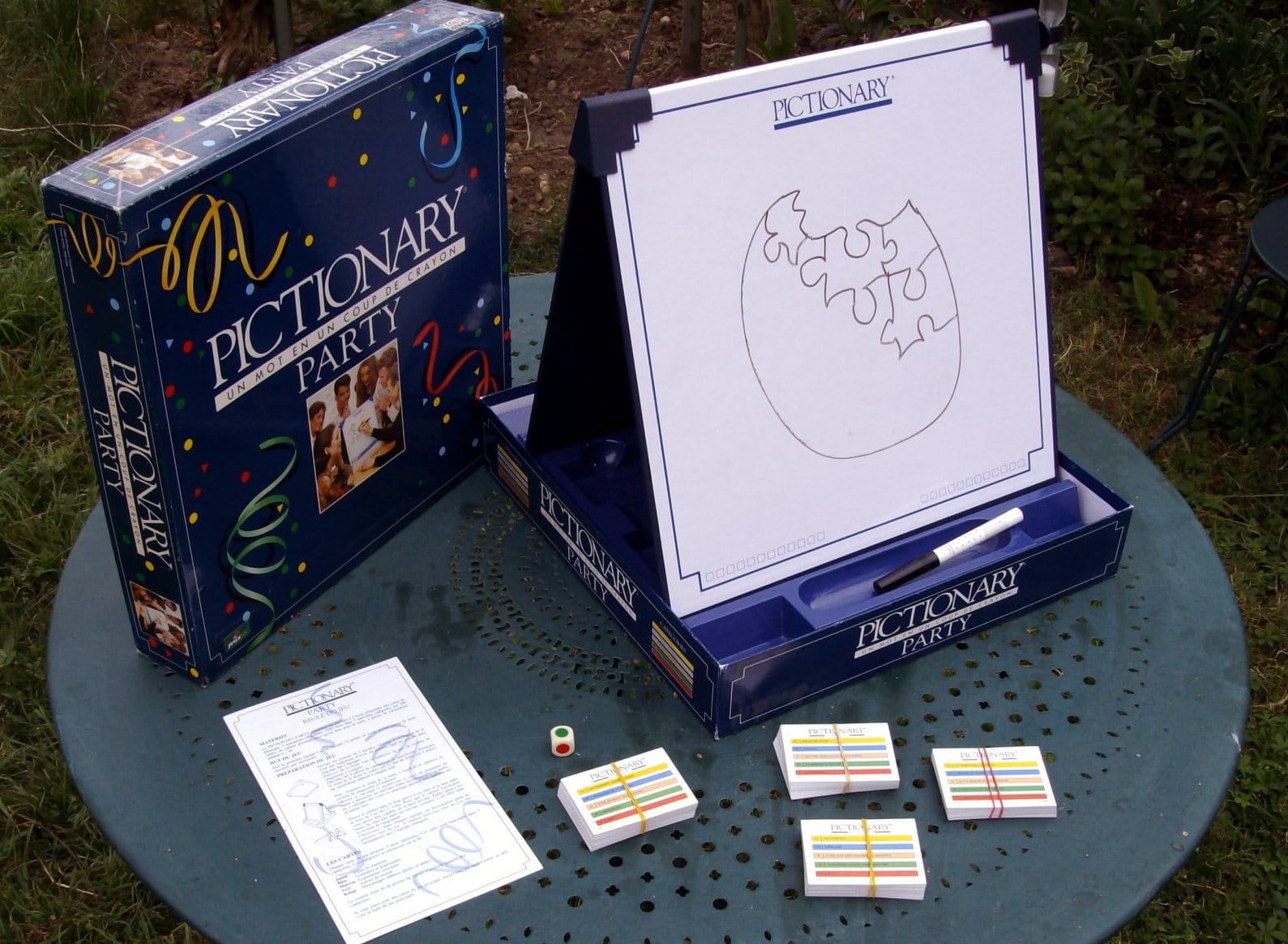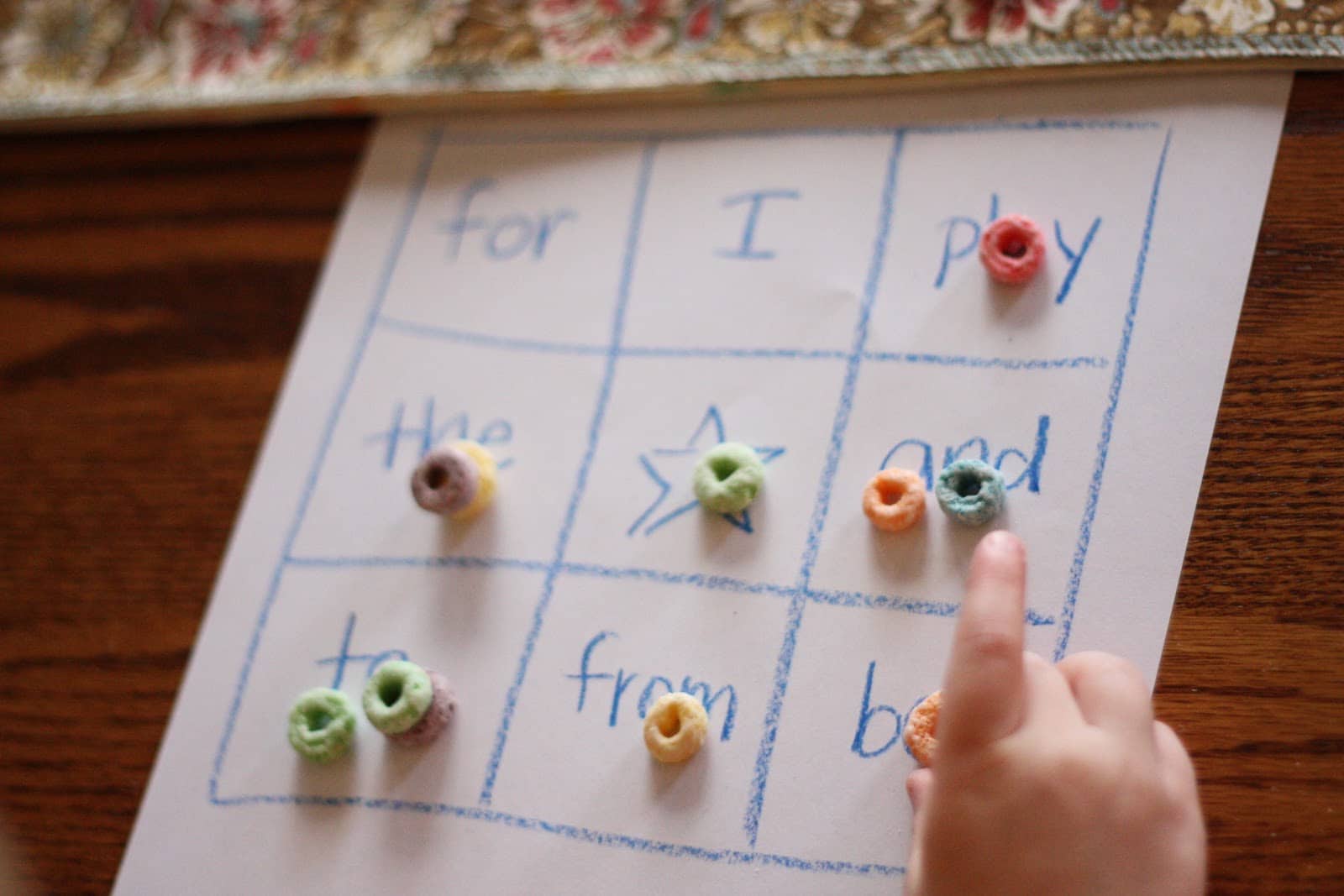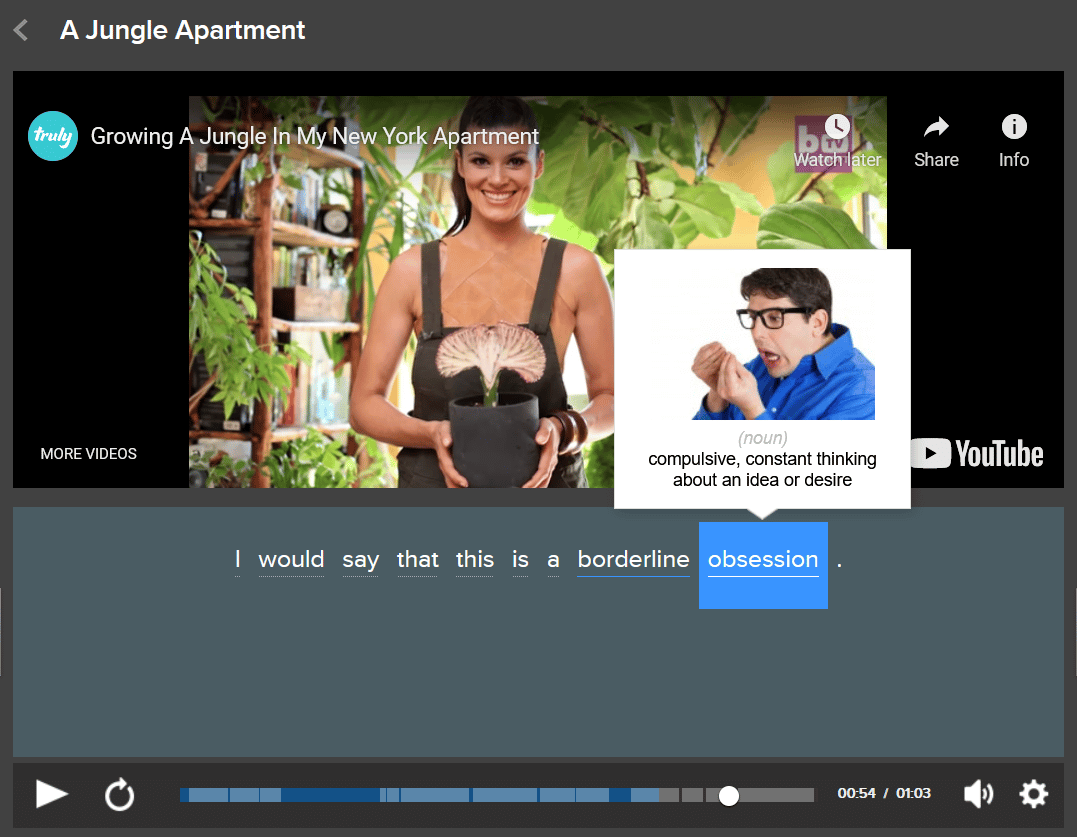You found our list of fun and simple vocabulary games for adults.
Vocabulary games are activities that include language and wordplay. Example games include Word Association and Hang Man. Players can enjoy vocabulary games in person or online. The purpose of these games is to strengthen vocabulary skills. These games are also known as “vocab games”, “letter games” and “vocabulary building games.”
These games make great online classroom activities and communication games, and can be used as online fun activities for employees.
This list includes:
- vocabulary games for adults
- simple vocabulary word games for adults
- fun online vocabulary games and activities
- English vocabulary games
- vocabulary games in English
- games to improve vocabulary
- vocabulary building activities
- vocab review games
- vocabulary games for students
Get ready to play!
List of vocabulary games
From Pictionary to word scrambles to synonym memory, here is a list of fun word games to play in classrooms, at parties, or during meetings.
1. Vocabulary Pictionary
Pictionary is a game of charades where players draw words instead of acting them out.
To play:
- Split the group into teams.
- Each round, assign one team member to draw.
- Give the drawing team member a word.
- Allow up to sixty seconds for teammates to guess.
- If the team guesses correctly, then assign one point.
You can give other teams the opportunity to steal, or move onto the next team’s turn. The game is a great way to practice new vocabulary, as players connect the word with an image. Pictionary is a fun game for virtual parties or in-person affairs.
To play Pictionary online, draw on the whiteboard app feature on your online meeting software.
2. Word Association
Word Association is one of the best vocabulary games for kids and classrooms since playing does not require a large vocabulary. The rules are simple and easy to understand. Typically, the game involves two players.
To play:
- Player one says a word.
- Player two responds with the first word that comes to mind.
- Player one either chooses a new word or responds to player two’s word.
- The game continues until one player repeats a word or pauses too long.
The rapid pace of the game generates excitement and occasionally results in funny answers.
If a student makes a mistake, then the teacher can pause the game and ask the student to explain or find a more fitting word. Ideally, gamemasters should allow players a few extra seconds to respond. Players should never feel embarrassed. There are no wrong answers in word association, but the game can serve as a learning opportunity to find better words.
If playing via Zoom, then player one or the teacher speaks a word, and other students answer in the chat. The class counts up matching answers and discusses different responses, guessing the reasoning behind each answer.
3. Vocabulary Hangman
Hangman is a classic chalkboard word game that translates easily to online play, thanks to digital whiteboards.
To play:
- Assign a player a word.
- The player draws a series of blanks corresponding to the number of letters in the word.
- Other players guess letters.
- If the letter is in the word, then the “executioner” fills in the blank. If not, then the executioner draws one portion of the gallows.
- The game ends when players guess the word, or when the picture is complete.
The best words to use for hangman contain less-used letters like z, x, and q. Examples of hard hangman words include zigzagging, razzmatazz, and quadrants.
4. Word search
Word searches are common classroom vocabulary games. These activities work well for handouts, and you can play during video calls by using the whiteboard feature and enabling annotation.
We made a sample word search you can use.
To make the game more competitive and exciting, turn the challenge into a race and award prizes to the first players to complete the puzzles.
5. Crossword
Crossword puzzles consist of a series of interconnecting boxes, each of which starts blank but contains one letter by the end of the game. Under the puzzle are two lists of clues, across and down respectively. Solvers need to consider the meaning of words, number of letters, and surrounding words, making the game strategic as well as literary.
Here is an example of a crossword puzzle you can use with your class or team.
Here is the answer key.
Crosswords are great word games for any age or skill level because puzzle makers can adjust the difficulty to suit players. To make your own crossword puzzle, use an online crossword creator.
6. Word Scramble
Word scrambles make great games for English class, and adults enjoy these language brain teasers as well. Simply mix up the order of the letters and ask players to unscramble and identify the original words.
Here is a sample to start with.
And here is the answer key.
To make your own word scrambles, use an online letter randomizer.
7. Scrabble
Scrabble is one of the most popular word games for adults or children. Players must use letter tiles to assemble words on the game board.
To play:
- Each player draws seven letter tiles.
- During turns, players can play tiles or exchange them for new letters.
- Players build words on the board, with each new word connecting to an existing word.
- Tiles have a point value assigned depending on the challenge of the letter. When a player makes a word, tally the letter and add the score to the point board.
More challenging letters have higher point values. For example, E is one point, while Z is ten. To find the point values for each tile and read more gameplay tips, check out this guide from Hasbro.
To coordinate the game for language lessons, assign higher scores for vocabulary words, and ask players to use the words in a sentence for extra points.
Scrabble is easy to play online, too, making it one of the best online vocabulary games. To play virtually, simply find a multiplayer online version of the game, such as Words With Friends.
8. Scattergories
Scattergories is one of the most fun and simple word games for adults. The game challenges players to think up words all starting with the same letter.
To play:
- One player rolls a letter die or uses a letter generator to pick the first letter.
- The timekeeper puts 60 seconds on the clock.
- Players write down one answer per category starting with the letter.
- When time runs out, players read the answers.
- Players receive a point for every answer.
Alliterative phrases count for double or triple points. If two players have the same answer, then they must cross it out and neither receives points. Of course, a player will not receive points for blank answers either. At the end of each round, the player with the most points wins.
Here is a list of sample Scattergories categories:
- A boy’s name, girl’s name, or gender neutral name
- Capital cities
- Four letter words
- Types of drinks
- Holidays
- Careers or professions
- Cartoon characters
- Websites
- Desserts
You could create more inventive categories for the game, or challenge players to make up prompts.
To play virtually, use the chat, screen-share, whiteboard functions in your virtual meeting platform. You can also share a Google Doc or Form, or join a multiplayer online Scattergories game together.
9. Tree or Bob Ross
Tree or Bob Ross is a fun video conference game that challenges players to guess a word by asking questions.
The player who conjures the word is The Post. The Post answers This or That questions whose answers help players narrow down the word.
The first question of the game is usually “is it more like a tree, or more like Bob Ross?” and The Post must answer accordingly. For instance, a rose is probably more like a tree, but Pinnochio presents an interesting challenge.
Each turn, the guesser adds a new word. For example, the second question might be, “is it more like a tree or a fern?” The game continues until players guess correctly. For more excitement, introduce a time limit, or award more points if players guess the word during earlier rounds.
10. Vocabulary Pyramid
Pyramid challenges players to guess words from context clues. The pyramid is a collection of six words, arranged with three on the bottom, two in the middle, and one at the top. To win, teams must guess all words within the pyramid in the allotted time.
To play:
- Divide the group into teams.
- Give one player on each team the pyramid.
- The pyramid holder must give hints to teammates describing each word without using the actual name of the item.
- When players guess correctly, the pyramid master can move to the next word. Or, players can say “pass,” and return to the word later.
- Teams receive a point for every correct guess.
When determining the time limit, consider the age of your players and the difficulty of the words. In general, 30 seconds per word, or three minutes total, is a good place to start, but add or take away time to increase or decrease the challenge.
11. Invisible Bridge
Invisible Bridge is similar to six degrees of Kevin Bacon. In both games, you must figure out a way to connect two seemingly distant concepts. Six degrees of Kevin Bacon uses actors, while Invisible Bridge uses words.
To play:
- A player suggests two unrelated words.
- Player one gives a number of planks. This is how many steps other players must use to relate the two words.
- The other players think up words that share similar traits, synonyms, or connector words to move from one term to another.
An example round might look as follows:
Tiger, Astronaut, eight planks
Tiger – Balm – Lip – Service – Customer – Happy – Pills – Capsules – Space – Astronaut
Meanwhile, Tiger, Astronaut, two planks might look like this:
Tiger – meat eater – meteor – Astronaut
One fun aspect about this game is there can be more than one correct answer, and opposing teams can dispute far-reaches. Invisible bridge encourages players to think about the nature of language and the relationship between words.
12. Poetry Improv
Poetry Improv is an exercise that challenges participants to craft verses on the spot.
To play:
- Pick a poetry style, such as sonnet, haiku, acrostic, limerick, or free verse.
- Give participants vocabulary words to use within the poem.
- Allow five or ten minutes for groups or individuals to complete the verses. If playing online via meeting software, then send groups to breakout rooms to work.
- Ask poets to share the masterpieces aloud.
For extra fun, turn other players into judges by asking them to rate the poems by holding up scorecards. To make the game more fast-paced, ask players to finish each others’ phrases on the spot for a true poetic improv.
13. Synonym Memory
The rules of Memory are easy: flip over two cards at a time and look for matching pictures or words. When players find pairs, they take the cards off the board. The player with the most pairs of cards at the end of the game wins.
Synonym Memory puts a challenging spin on the simple game. Instead of hunting for exact matches, players pair up words with synonyms.
Here are some sample matches:
- enticing/tempting
- assume/suppose
- patience/restraint
- revoke/rescind
- impact/collision
The game encourages players to think in different ways, as participants will need to remember the location of the cards as well as consider meanings of words.
To play online, make your own virtual synonym memory game with an online tool and share screens to play, with one player flipping over the cards at other players’ request.
List of words to use for vocabulary games
Here is a list of great words to use in word games:
- serendipity
- fortitude
- akimbo
- sumptuous
- ineffable
- zephyr
- incorrigible
- medallion
- mauve
- bombast
- denouement
- contemporary
- gossamer
- inane
- hippodrome
- concession
- ideology
- quintessential
- prescient
- regurgitate
- gnash
- cataclysmic
- knell
For further inspiration, use a random word generator or consult online lists of difficult or intersecting words.
Conclusion
Vocabulary games and activities test and strengthen players’ communication skills. These word games minimize frustration by disguising language lessons in the form of an exciting challenge. Not to mention, simple word games are fun for adults and kids alike, and make great icebreaker activities during meetings. Most games only require words and a way to share them, so playing word games online via Zoom or similar platforms is easy.
For even more smart fun, check out our posts on problem solving games, question games and team building brain teasers.
FAQ: Vocabulary Games
Here are answers to common questions about vocabulary games and activities.
What are vocabulary games?
Vocabulary games are word and language games you can play with students, coworkers, or family and friends. These games challenge players to hunt for words or definitions, brainstorm terms, deduce phrases based on clues, or create words under certain conditions. Language games are a great way to teach new vocabulary and help students practice recognizing and using new words. These activities are also known as “vocabulary building games” and “vocab games”, and are similar to “word games” and “letter games”.
What are some fun word games for groups?
Some fun word games for groups include Pictionary, Tree or Bob Ross, and word scrambles.
What are some online vocabulary games?
By using virtual meeting software like Zoom, you can play any word game online. Some good virtual vocabulary games include Scrabble, Scattergories, and online crossword puzzles.
What are good ESL word games?
The best ESL word games are easy to understand and play yet expand the vocabularies of participants. Good ESL word games include word association, word searches, and hangman.
What are fun ways to teach vocabulary?
Word games are one of the most fun and easy ways to teach vocabulary. While some kids get frustrated with straightforward reading or language exercises, word games disguise vocabulary lessons as a fun challenge. Plus, playing language games together is a great teamwork exercise.
The acquisition of new vocabulary is essential in terms of overall language advancement. However, there is always a need to review active words from time to time in order to use them fluently in speech. Here, we will present a couple of great vocabulary revision games which will perk up every classroom. Through these games the learners will feel how fun, entertaining and effective the learning process can be.
1. Charades
Charades is a fun and cool revision game. Students need to practice their acting skills to explain the words. This game is extremely easy to organize with minimal advance preparation. The only thing to be ready for is to keep a collection of vocabulary cards for the words you have studied.
The class is divided into two teams. Each team member takes turns acting out one of the words from the vocabulary set and explains it by acting out the word. If his or her own team can’t guess the word, the opposite team gets the chance to guess it. Each right answer equals one point.
Skyeng ищет преподавателей английского. Подробности по ссылке: Skyeng
2. Pictionary
Pictionary is also an entertaining game to play for vocabulary review. The rules are similar to those of charades except that instead of acting out the word, it is drawn on the board.
3. Bingo
Bingo can serve as a good revision game. From my experience, most of the groups/students like playing bingo because it gives them the chance to reflect on the words they have digested.
Students are given a blank bingo board and are asked to put the review words into the squares randomly. The teacher puts the active words in a hat or a box, takes them out one by one and defines them. If the student has a word corresponding to the definition, he crosses it out on his bingo board. When someone gets five squares in a row, they should shout, “Bingo!”
Check these articles out as well:
4. A memory style
A memory style card game can be another effective way for reviewing vocabulary. It requires some preparation before the game starts. For each word to be reviewed, one card should have the target vocabulary word and another card should have the definition of the word. You also need to have a big playing grid where you put the words and their definitions face down.
Each person turns over two cards each turn trying to find a match. If the cards do not match, he turns them over again and the next person tries to find a match. If he succeeds, he keeps the cards and gets an additional turn. The player with the highest number of cards at the end of the game wins.
The game can be modified even further. If you have accumulated enough synonyms or antonyms to the target vocabulary, you can practice matching target words to their antonyms or synonyms.
5. Categories
Categories is another awesome revision game which will make students energized and empowered. What they need for the game is to draw 4-6 columns on their paper and write a category at the top of each column. Categories fit the topics covered during the course. For example, if you have covered the business topics of Marketing, Work and Leisure, Ethics, Human Resources, Travel, you write these topics as categories.
You time the students and ask them to write as many words as possible under each category. As a further modification, choose a random letter and write it on the board. Give students enough time to write down a word for each category that starts with that letter.
Экономьте время на подготовку к урокам и проверку домашних заданий со Skyeng. Удаленный формат занятий, защита от внезапных отмен и график, который настроен специально под вас. Присоединяйтесь к нашей команде. Подробности по ссылке: Skyeng
6. Letter scramble
Letter scramble will make students really competitive and super fast. What you need is to take a list of words that your students have recently learned and write a scrambled version of each on the board. Students need to unscramble the words on their paper. The first one to finish deciphering all the words wins.
7. Stop the bus
Stop the bus is a cool game my students adore. I usually divide the class into 2-3 teams. One student from each team. This student sits on a chair facing his peers. Then from behind the student in the hot seat, show the other students a word from the lesson. The other students must try to describe what the word is without saying the actual word. And the student in the hot seat must guess.
The student who guesses the word shouts out “stop the bus” and checks the word with the teacher. If correct, the team gets a point. If wrong, other teams have the chance to guess the word by writing their versions on a piece of paper and passing the papers to the teacher.
8. Puzzles
Puzzles is another cool and easy tool to review the material in an effective way. What I like about this way of vocabulary revision is that students can work in pairs or groups while trying to find words matching the definition in the crosswords. They learn by listening to each other, cooperating to find the right answer. In this way, they both review the material and improve their teamwork skills.
Follow this link to get templates of different types of puzzles.
We also recommend watching a video with Alexei Konobeev. The speaker shared games to help your students remember new vocabulary. These games do not require special training and you can adapt them to any age and level.
We hope that all these games would serve their best to liven your vocabulary revision sessions and make them more meaningful and effective.
Which of these games have you tried? Which ones have you picked up for your next revision slot?

***Call my Bluff***
If you want to challenge your advanced learners, get them into teams to play this competitive word game based on a popular old-time British quiz show. Give each team a set of dictionaries and a list of words, making sure to choose vocabulary that is useful but unlikely to be familiar. Teams look up the definitions of the words on their list and then – this is where the game gets tricky – invent two alternative but plausible definitions for each one. The contest involves the teams taking turns to read out their words along with the three definitions and asking their opponents which definition is correct. Award points not only for correct answers but also for the most inventive alternative definitions. Here’s an example:
distraught – a) completely ruined b) extremely worried c) blown down by the wind
***Tailcatcher***
Get your younger learners into a circle and see how quickly they can play this simple spelling game without getting dizzy or confused. The first student says a word at random – let’s say, ‘cheese’ – and then the student to his or her left has to say a word beginning with the last letter of the that word – for example, ‘elephant’. The game carries on with students taking turns to say a word beginning with the last letter of the previous word – ‘elephant’, ‘tennis’, ‘stick’ and so on. If the word starts and ends in the same letter – say, ‘kick’ – then the direction reverses. Give students a time-limit to come up with a word to avoid elimination, or make things more challenging by sticking to categories, such as food, animals or sports.
Not your traditional hangman!
***Here comes the shark! or Bang!***
Everyone knows how to play Hangman, and it works well with younger learners not only to practice spelling but also to practice the names of the letters, but why not replace the traditional gallows and prisoner set-up with something more unusual? The burning fuse on a bomb that ends the game in an explosion or a swimmer and a Jaws-like approaching shark-fin are guaranteed to amuse the students (see image). You might even let them come up with their own version.
***Half a crossword***
This is an excellent way for students to learn the all-important language skill of describing or defining something for which they lack the particular item of vocabulary. Create a crossword (there are plenty of crossword-creator sites online) and give one half of the answers to student A and the other to student B (you can prefill in the answers on the separate handouts). Rather than provide clues, the pairs of students have to work together – without showing their half of the crossword to their partner – to complete the puzzle by giving definitions of the words their partner is missing.
***Ring-ding-dong**
Here’s another game that works well with young learners and requires no preparation. Board a simple word such as ‘shoe’ and give teams of students a couple of minutes to come up with as many new words as they can from that word by changing one letter at a time. Step – stop – shop – shoe – show – chow – chop – chip etc. It’s not easy, but you can vary the rules by allowing the addition or subtraction of a letter instead of a replacement. The team with the most words wins.
***Taboo***
Here’s a well-known word game that can even be challenging for native speakers. In teams, players attempt to get a teammate to guess a particular word on a card by giving clues or definitions. The challenge is that they are forbidden from using the most obvious clues, which are laid out in a list on the card. They might have to define ‘exam’, for example, but without using the words ‘test’, ‘study’, ‘pass’, ‘fail’ or ‘grade’. It’s an excellent way to hone those skills of definition, as well as a sure-fire means of raising the volume in class. If you have teams prepare the cards for their opponents, you could even join in yourself.
Don’t forget to sign up to our ELT blog. You’ll find lots of great stuff to read here!
More info: ELT Argentina – ELT Chile – ELT Spain & Portugal – ELT Uruguay & Paraguay – ELT Central America and the Caribbean

A word association game is a game in which a word is given to a student and then that student must say an associated word or phrase. Word association games are a fantastic way to help students practice using their existing vocabulary and to learn new English words.
While playing word association games, students are likely to encounter words that they have not heard before. These words are associated with the vocabulary they already know, and so it is very easy for students to guess the meanings of these new words. This makes word association games fantastic for learning new words.
Let’s look at some different ways in which you can play word association games with your students.
Simple Word Association
The simplest way to play word association games in class is to simply give one student a word and ask that student to say the first thing that comes to mind. For example, if you say the word “drink” a student might say the word “juice”. Then, the next student should say the first word which comes to their mind, for example, “orange”.
If you’re playing this game with kids, then to make it even more fun you could get them to pass a ball as they play. When a student has the ball it is their turn, and once they have said their word they should pass the ball to the next player.
However, if you are playing word association games while social distancing in the classroom, then it is probably best not to pass a ball around. Instead, you could ask your students to stand up from their desks when it is their turn.
Word Association Topics
Another fun way to play word association games in class is to choose a particular topic and ask students to say words associated with that topic. Usually, when playing word association games, students would start at one word, and after a few turns, the words might become completely unrelated to the original topic.
But when playing a word association game with a particular topic, all words must be related to the main topic. For example, if you choose the topic ‘food’ then every word must be a kind of food. If a student says ‘milk’ for example, then that student would be out as it is a drink and not a food.
Here are some topics you could use for your next word association game:
- Types Of Food
- Types Of Drinks
- Countries
- Hobbies
- Sports
- Superheroes
- Colors
- Furniture in a house
- School Subjects
- Types Of Weather
Guess The Secret Word
A really fun way to get your students thinking while playing a word association game is to have them try and guess a secret word. Rather than have students say any associated word that comes to mind, instead think of a secret word and tell them some words associated with that.
Then students should try to guess what the secret word is. To make it more fun you could even ask students to guess other words which might be associated to the secret word.
For example, if the secret word was ‘yellow’ you could say the word “banana” to your students. Then they might guess something like “apple” and you can tell them it is not related. But when they say something like “lemon” you can tell them that it is associated with it.
After some time students will be able to guess the secret word. This way of playing a word association game is a fantastic way to get students to practice their thinking skills while learning new vocabulary.
Ryhming Words
This way of playing word association games can lead to some hilarious answers. Simply give students a word and ask them to come up with a word which rhymes. In this game, the words don’t necessarily have to be related. They just need to rhyme.
For example, you might say the word “cold” and students might say “old”, “mold”, “bold”, “told”, etc. The first student who can’t come up with a rhyming word is out.
Chain Game
This last word association style game is one you have probably played at some point in your life. In this game a student would say one word and then the next student must say a word which starts with the last letter of the previous word.
For example, if the word was ‘pizza’ then the next student must say a word beginning with ‘a’. Then, the next student might say “apple” and so the next student must say a word beginning with ‘e’. And so, on. The first student who cannot say a word is out.
Thanks for reading. I hope you found some inspiration for your next word association game.
Before you go, don’t forget to check out our free lesson materials, including ESL Games, PowerPoint Games, ESL Worksheets, ESL PowerPoints, and ESL Printables.
Games aren’t only for fun and learning outside of the classroom. The right board game can be a great learning tool in your class this upcoming school year as well. This is true both in ESL (English as a Second Language) and traditional English-speaking classrooms.
These following games have all been used reliably by teachers to help English learners master new vocabulary and feel more confident in their speaking skills. You’ll find your students will benefit most if you modify the rules to fit the skills and needs of your classroom. They are also fun and a change of pace for your students, which can help keep the flame of learning interest burning bright. They don’t take much prep time by the teacher either – so it’s a win for everyone!
Top Board Games For ESL Students and Classrooms
 |
Bananagrams |
Check price at |
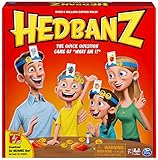 |
Hedbanz Game Most Popular |
Check price at |
 |
Scrabble |
Check price at |
 |
Scattergories |
Check price at |
 |
Mad Gabs Picto-Gabs Lowest Price |
Check price at |
1. Bananagrams
This fast-paced game is a ton of fun to play. Players are each given a set of letters and use them to build their own grid of words. When one of the players has used all her tiles, everyone must draw a tile and work it into their grid. Words are not permanent however; you may take your existing words, break them apart and use them to help make new words.
Kids will learn spelling structures and reinforce common word prefix and suffixes while playing this game. It also is a great outlet for creativity for more advanced learners.
2. Hedbanz Game
Hedbanz is a take on the classic “What Am I” game. Players each grab a card face-down, and never look at it. Instead, they affix the card to their “headband” so all the other players can see what is represented on the card. Players then take turns asking the other players questions to try to determine just who they are. Most cards are of normal household items, animals, foods, etc.
This game is a great way to help kids get used to asking questions about different topics than they might usually cover in class. The game comes with a helpful “question card” to get each player started on questions they normally should ask. It’s also fun (and sometimes agonizing) as a player gets so close to the right answer but can’t quite nail it down.
3. Scrabble
Scrabble is a classic word game enjoyed by generations of students. Players are given a selection of letters which they use to make words in a crossword pattern. Players build words off of the tiles that previous players have placed. Bonus points are given for covering special tiles on the board with letters.
ESL teachers have found that this game is often played with some changes to the normal rules. Allowing students to consult a dictionary, collaborate with friends and refrain from keeping score can help some students. It’s also a good chance to discuss the meanings of the words used in the game when appropriate.
4. Say the Word
Say The Word is a cooperative “silly story” game that can really break the ice for a group of students. Players are given a kooky character, some silly words to use and are challenged to create sentences that keep an ongoing story moving forward. Warning: your classroom will be filled with spontaneous outbursts of laughter as the stories continue to get goofier and goofier each turn.
This game is aimed at children 10 and up, though younger children may be able to keep up. It helps to develop listening skills, and promotes bonding and risk-taking. It’s hard to take yourself too seriously while playing this game, which provides the “safe zone” some students need to expand their vocabulary.
5. Photographic Memory Matching Game
The Stages Learning Photographic Memory game pack can help less-advanced English speakers expand their vocabulary while having fun. Cards contain both pictures and corresponding words. Players place cards face down on a table and pick two at random. If they match, great. If not, the player tries to remember what card is at what location so they can make a match later on.
This game can be used in a few ways. With students new to English, it’s best if the game is played by a group, all working together. As students become more advanced, they can begin to play as individuals. You’ll get more results if you can encourage discussion about the items and animals represented on the cards.
6. Scattergories
Scattergories is a great way for students to work on and practice the words they already know. Players are given a list of ten categories for that round. While they do come with the game, you can always make up your own categories to suit the needs of your particular classroom. The game is started when a 26-sided die is rolled to reveal a letter.
Players must then think of words that start with that letter for each of the ten categories. Usually, a timer is set and when time runs out the round is ended. Players read their words to the group. The kicker is, any word used by more than one player is knocked out and doesn’t count. This teaches students to try to expand their vocabulary beyond common words to avoid that fate.
Beginning learners might benefit from a smaller list of categories and having it tied into some other lesson you are working on in class.
7. Mad Gabs Picto-Gabs
This game is not a classic, but one that would likely work in more advanced classrooms. Players say the words they think go along with the pictures on the cards. The phrase that solves the puzzle will sound similar to the words said outloud, but not exactly. For example, one puzzle is the picture of a man’s head with an arrow pointing to his hair + the words “fours” and “won”. Did you guess the answer? (Air Force One)
As I said before, this is definitely for more advanced students but in the right classroom it can help with listening skills and word and phrase differentiation. It also sounds like a lot of fun. The risk is using it with students that aren’t able yet to grasp the nuances of English needed for the game.
Bryan Bigari is the current editor of Fractus Learning. As a father of three, Bryan has a passion for helping kids to both excel in school and have fun with friends and parents. He has worked on education issues at the state and federal level, and is looking forward to sharing his first hand education and toy knowledge with you.
If you want to improve your writing, maybe it’s time to ditch all the writing books and podcasts and play some word games instead.
Yes, seriously! Word games and writing games are great ways to develop your vocabulary, to help you think more deeply about words, to have fun with story and structure, and to get a lot of fun out of writing.
But games can be a great way to:
- Develop your vocabulary
- Help you think more deeply about words
- Become more fluent in English (if it’s a foreign language for you)
- Invent and develop characters
… and much more.
After the list of 50 writing games, I’ve given you a top ten that I think are particularly great for kids who want to practice their writing skills. Many of the other games are suitable for children, too, so by all means try out other games as a family if you want to.
Of course, there are loads of online games (and quizzes and tools) that you can use to improve your writing skills, and I will be talking about some of the best of those. But there are also lots of tried-and-tested classic games that you can play with pen and paper, or using cards and dice … and we’ll be taking a look at those first.
5 Pen and Paper Word Games
I’ll start with the simplest games: pen and paper ones that you can play pretty much anywhere, so long as you have a pen.
All of these are suitable for children, and some (like crosswords) are enjoyed by many adults too.
#1: Hangman (2+ players)
Hangman is a classic word game for two players. One player thinks of a word and writes down dashes to represent the number of letters. The other guesses letters of the alphabet. Correct letters are inserted into the word; incorrect letters result in another segment of the “hangman” being drawn.
This is a great game for developing spelling and vocabulary. If you’re playing it with small children, you can do it without the perhaps rather unpleasant “hangman” element, and just count how many guesses each player takes!
#2: Crosswords (1 player)
A crossword is a grid of white and black squares, where each white square is one letter of a word. The words intersect. You can find crosswords in many newspapers and magazines (on all sorts of subjects), and you can buy booklets and books full of them. Some crosswords are “cryptic”: great if you like brainteasers. Others have more straightforward clues.
Crosswords are great if you want to learn new words and definitions, or (at the cryptic end of the scale) if you enjoy playing with words and language. Simple ones are suitable for fairly young children, with a little help.
#3: Word searches (1 player)
A word search has a grid (often 10×10 or more) filled with letters, and a number of words written alongside or beneath the grid. The person completing the word search needs to find those words within the grid.
Most word searches are easy enough for children, though younger children will struggle with backward and diagonal words. They’re a good way to get used to letter patterns and to improve spelling – and because word searches rely on matching letters, even children who can’t read well will be able to complete simple ones.
#4: Consequences (2+ players, ideally 4+)
This is a fun game with a group of people, as you get a wild and wacky mix of ideas. Each player writes down one line of a story and folds the paper over before passing it around the table to the next player. The very simple version we play has five lines: (1) A male name, (2) The word “met” then a female name, (3) “He said …” (4) “She said …” (5) “And then …”
Once all five stages are complete, the players open out the papers and read out the results. This can be great for sparking ideas, or as a way to encourage reluctant writers to have a go.
#5: Bulls and Cows (2 players)
This game, which can also be called “Mastermind” or “Jotto” involves one player thinking up a secret word of a set number of letters. The second player guesses a word; the first player tells them how many letters match in the right position (bulls) and how many letters are correct but in the wrong position (cows).
Our five year old loves this game, and it’s been a great way to develop her spelling and handwriting as well as logical thinking about which letters can or can’t be the correct ones after a few guesses.
10 Board and Dice Games
These are all games you can buy from Amazon (or quite probably your local toyshop). They’re fun ways to foster a love of writing within your family, or to share your enjoyment of words with your friends.
#1: Scrabble (2+ players)
A classic of word games, Scrabble is a game played with letter tiles on a board that’s marked with different squares. (Some squares provide extra points.) Letters have different points values depending on how common they are. The end result of scrabble looks like a crossword: a number of words overlapping with one another.
If you want to develop your vocabulary (particularly of obscure two-letter words…) then Scrabble is a great game to play. It’s suitable for children too, particularly in “Junior” versions.
#2: Boggle (2+ players)
This is less well known than Scrabble, but it was one I enjoyed as a child. To play Boggle, you shake a box full of dice with a letter on each side, and the dice land in the 4×4 grid at the bottom of the box. You then make as many words as you can from the resulting face-up letters.
Again, this is a good one for developing vocabulary – and it can be played by children as well as by adults. You need to write down the words you come up with, which can also be good for developing handwriting.
#3: Pass the Bomb (2+ players)
It’s very simple to play: you deal a card for the round pass a “bomb” around the table and when it goes off, the person holding it loses. Before you can pass the bomb on during your turn, you need to come up with a word that contains the letters on the card.
It’s a fun family or party game, and can work well with a wide range of ages. It’s a great way to help children think about letter patterns, too, and to develop vocabulary and spelling.
#4: Story Cubes (1+ players)
There are lots of different versions of these available, and they all work in a similar way. The open-ended game has a set of cubes that you roll to create ideas for a story that you can tell along with the other players. If you prefer, you can use them to come up with stories that you’re going to write on your own.
There are lots of different ways you can use them: as writing prompts for a school class or group, to make up a bedtime story together with your children, for getting past your own writers’ block, or almost anything you can think of.
#5: Apples to Apples (2+ players)
Apples to Apples has red cards (with the name of a person, place, thing, etc) and green cards (with two different descriptions): the player with a green card selects one of the descriptions, and others have to choose a card from their hand of red cards. The judge for that game decides which red card best matches the description.
If you want to develop your vocabulary (or your kids’), this could be a fun game to play. There are lots of expansions available, plus a “junior” version with simpler words. (If you’re playing with adults, you might also want to consider Cards Against Humanity, a decidedly not-kid-friendly game that works in a very similar way.)
#6: Letter Tycoon (2+ players)
In this game, you have a hand of 7 cards which you can use in conjunction with the 3 “community cards” to create a valuable word. It’s a more strategic game than some others, with aspects of finance (like patents and royalties) involved too – if you’re a budding tycoon, you might really enjoy it.
Because not all the game strategy depends on simply being good with words, it doesn’t matter if some players have a larger vocabulary than others. It’s suitable for children, too, so you can play it as a family game.
#7: Dabble (2+ players)
Dabble is a family-friendly game where you compete with other players to be the first to create five words (of 2, 3, 4, 5 and 6 letters) using your 20 tiles. It’s very simple to get the hang of … but coming up with the words might be more challenging than you expect!
If you enjoy Boggle or Scrabble, you’ll probably have fun with Dabble. It’s a great way to develop both spelling and vocabulary, and to have fun with words.
#8: Upwords (2+ players)
Upwords is like 3D Scrabble: you can stack tiles on top of other tiles to create new words. The board is smaller than a Scrabble board (and doesn’t have double and triple word score squares) so it’s not as complex as it might initially sound.
Like similar games, it’s a great one for building vocabulary and for developing your spelling. It’s suitable for kids, too, so it could be a great game for the whole family.
#9: Tapple (2+ players)
Tapple has a wheel, with most of the letters of the alphabet on it, and lots of different “topic cards” that cover 144 different categories. There are lots of different ways you can play it – the basic rules are that each player has to think of a word that fits the topic within 10 seconds, but that word can’t start with a starting letter that’s been used previously.
While small children might find it a bit too challenging or frustrating, due to the short time limit, this could be a great game for older children looking to extend their vocabulary. All the categories are suitable for kids.
#10: Last Word (2+ players)
In Last Word, players have to come up with answers to “Subject” and “Letter” combinations, racing to get the last word before the buzzer. It works a bit like a combination of “Tapple” and “Pass the Bomb”.
You can easily play it with a large group (there are tokens for up to 8 players, but you could add more without affecting the gameplay). It’s a great way to develop vocabulary and, to some extent, spelling.
5 Roleplaying Games
While my geeky tendencies have been reined in a bit since I had kids, I’ll admit I have a great fondness for roleplaying games: ones where you come up with a character (often, but by no means always in a magic-medieval setting) and play as them. These are some great ones that you might like to try.
#1: Dungeons and Dragons (3+ players)
Although you might never have played Dungeons and Dragons, I’m sure you’ve heard of this classic roleplaying game that’s been around since 1974 and is now onto is 5th edition. It takes rather longer to get to grips with than a board or card game: to play, you need a “Dungeon Master” (essentially the storyteller of the game) and at least two players (who each control a character), plus rulebooks and a lot of different dice.
It’s a great game for developing the “big picture” aspects of writing, like the ability to construct a plot and a story (if you’re the Dungeon Master) and the skills involved with creating a character, giving them a backstory, and acting “in character” as them (if you’re one of the players).
#2: Amazing Tales (1 parent, plus 1 or 2 children)
This is a kid-friendly RPG aimed at parents who want to create a story with their child(ren). It’s like a very simple version of Dungeons and Dragons, and has straightforward but flexible rules. You can play it with a single six-sided dice – though it’s better if you have four dice (with six, eight, ten and twelve sides).
If you want to encourage your child’s creativity and have fun creating stories together, this is a wonderful game to play. The rulebook contains lots of ideas and sample settings, with suggested characters and skills … but you can come up with pretty much any scenario you like.
#3: LARP (Live Action Roleplay) (lots of players)
Over the past decade or so, LARP has become a bit more mainstream than it once was. It’s short for “Live Action Roleplay” … which basically means dressing up as your character and pretending to be them. It’s a bit like Dungeons and Dragons crossed with improv drama.
The nature of LARP is that it needs quite a lot of people, so unless you have loads of friends to rope in, you’ll want to join an organised LARP – there are lots out there, covering all sorts of different themes, from traditional fantasy ones to futuristic sci-fi ones. Some are suitable for children, but do ask event organisers about this. They won’t necessarily involve any sort of writing, but can be a great way to explore characters and dialogue.
#4: MUDs (lots of players)
MUDs, or “multi-user dungeons” have been around since the early days of networked computing in the ‘70s, and are the forerunners of games like Fortnite and World of Warcraft. They’re now distinctly retro-looking text-based online games, where players create a character and interact with other characters and the world.
Like other types of roleplaying game, they’re a great way to practice storytelling and character-development skills. They also involve a lot of writing – so they can be useful for things like vocabulary and spelling. Some are suitable for children, but as with anything online, do ensure your children know how to be safe (e.g. by not giving out their full name, address, etc).
#5: Online Forum Games / Forum Roleplaying (2+ players)
Some fan communities write collaborative fanfiction through forums (here’s an example), with different people posting little pieces as different “characters” to continue a story. These can be quite involved and complex, and they can be a great way to learn the skills of telling a long, detailed story (e.g. if you’re thinking of writing a novel).
They’ll probably appeal most to writers who are already producing fanfiction on their own, and who have a fair amount of time for the back-and-forth required for forum roleplaying. Again, if your child wants to get involved with this type of roleplaying, do make sure you monitor what they’re doing and who they’re interacting with.
10 Word Games You Can Play on Your Phone
These days, many writers are more likely to have their phone to hand than a pen and paper … and to be fair, there’s nothing wrong with that. You can easily make notes on a phone, whether by tapping them in or by recording them. If you find yourself with a bit of time on your hands, why not try one of these writing-related games?
Note: all of these are free to download, but most allow in-app purchases, and you may find you need to make a purchase to get the most out of them.
#1: Bonza Word Puzzle
This game is a bit like a deconstructed crossword: you get bits of the puzzle and you drag them together to form words that will all match with the clue. If you’re a fan of crosswords and want something a bit different, you might just love it.
It’s a great way to think hard about letter patterns and how words are put together, so it might be a good game for older children who’re looking to develop their spelling and vocabulary, too.
#2: Dropwords 2
Dropwords 2 (a rewrite of the original Dropwords) is a word-finding puzzle where letters drop from the top of the screen: if you remember Tetris, you’ll get the idea. It’s a bit like Scrabble or Boggle, and you have to race the clock to make letters out of the words on the screen.
With six different modes (“normall”, “lightning”, “relax”, etc), it’s suitable for children and for people who are learning English, as well as for those wanting to really challenge their vocabulary skills.
#3: Spellspire
Spellspire is a fantasy-style game where you select letters from a grid to create words: the longer the word, the bigger the blast from your magic wand! You can kill monsters, buy better equipment, and make your way to the top of the Spellspire.
If your kids aren’t very motivated to practice their spelling, this could be a great game for them. (Or, let’s face it, for you!) You can also choose to play it against your Facebook friends, adding a competitive element.
#4: TypeShift
This is a relatively simple game that lets you create words from letters arranged on different dials. There are a couple of different ways you can play: by trying to use all the letters on the dials at least once to create words, or by tackling the “Clue Puzzles”, which are a bit like crossword clues.
Again, if you want to develop your spelling and vocabulary, this is a straightforward game that you can use to do so. You can buy extra puzzle packs at a fairly reasonable price, if you find that you want to play it a lot.
#5: Wordalot
This crossword app uses pictures rather than written clues, which is a fun twist. You can use coins to get hints (you can earn these through the game, or purchase them with real money).
If you enjoy doing crosswords but want something a bit different, give this one a try. You might find that as well as helping you develop your spelling and vocabulary, it’s a great way to develop your lateral thinking as you puzzle out the clues.
#6: WordBrain
This game is another one where you have to find hidden, scrambled words within a grid. There are loads of different levels (1180!) and so this could keep you busy for a long time. You can purchase hints – this could potentially see you clocking up quite a spend, though.
All the words are appropriate for children (though some are tricky to spell), so your kids might well enjoy this game too, as a way to develop their spelling and vocabulary.
#7: Ruzzle
Ruzzle works like Boggle, with a 4×4 grid of letters that you use to make words (the letters must be adjacent to one another). You can play it against friends, or simply against random players.
Like the other apps we’ve looked at, it’s a good one for developing your vocabulary and spelling. Some players said it included too many ads, so this is something to be aware of if you plan to use the free version rather than upgrading.
#8: WordWhizzle Search
This is a word search type game with loads of different levels to play. If you enjoy word searches, it’s a great way to carry lots around in your pocket! You can play it alone or with Facebook friends. It’s easy to get to grips with, but the levels get increasingly tricky, so you’re unlikely to get bored quickly.
As with other apps, this is a great one for developing your spelling and vocabulary. Each level has a particular description (words should match with this), so you have to avoid any “decoy” words that don’t match.
#9: 7 Little Words
This game works a bit like a crossword: each puzzle has seven clues, seven mystery words, and 20 tiles that include groups of letters. You need to solve the clues and rearrange the letter types so you can create the answers to the mystery words – so it’s also a bit like an anagram.
There are five different difficulty levels (“easy” to “impossible”) and each game is quick to play, so this could be a good one for kids too. Again, it’s a great way to develop vocabulary and spelling.
#10: Words With Friends
This classic word-building game is hugely popular, and you can play against your Facebook or Twitter friends, or against a random opponent. It works just like Scrabble, where you have seven letter tiles and add them to a board.
You can chat with the opponent in a chat window, so do be aware of this if you’re allowing your kids to play. The game is a great way to develop vocabulary and spelling, and you can play it fairly casually because there’s no time limit on your moves.
10 Word Games You Can Play in Your Browser
What if you want a writing-related game you can play while taking a break at your computer? All of these are games that you can play in your browser: some involve a lot of writing and are essentially story-telling apps, whereas others are essentially digital versions of traditional pen and paper games.
Unless otherwise noted, these games are free. With some free browser games, you’ll see a lot of ads. If this annoys you, or if you’re concerned that the ads may be unsuitable for your children, you may want to opt for premium games instead.
#1: Wild West Hangman
This is a digital version of Hangman, which we covered above. You choose a category for words (e.g. “Countries” or “Fruits And Vegetables”) and then you play it just like regular Hangman.
It’s simple enough for children – but it only takes six wrong guesses for your cowboy to be hanged, too, so it could get frustrating for younger children.
#2: Word Wipe
In Word Wipe, you swipe adjacent tiles (including diagonals) to create words, a bit like in Boggle. The tiles fall down a 10×10 grid (moving into the blank spaces you’ve created when your word disappears from the grid) – your aim is to clear whole rows of the grid.
Since the easiest words to create are short, simple ones, this is a great game for children or for adults who want to get better at spelling.
#3: Sheffer Crossword
As you might expect, this is a crossword game! There’s a different free puzzle each day, and you can choose from puzzles from the past couple of weeks. It looks very much like a traditional crossword, and you simply click on a clue then type in your answer.
The clues are straightforward rather than cryptic, though probably not easy enough to make this a good app for children or for English learners. If you’re a fan of crosswords, this will definitely be a great way to develop your vocabulary, though.
#4: Twine
Twine is a bit different from some of the other games we’ve looked at: it’s a tool for telling interactive stories (a bit like the old “Choose Your Own Adventure” books, or a text-based adventure game). You lay out your story as different cards and create connections between them.
If you want to experiment with interactive fiction, this is a simple, code-free to get started – as reviewer Kitty Horrorshow puts it, “if you can type words and occasionally put brackets around some of those words, you can make a Twine game”. It’s a great way to deepen your understanding of story, plot and narrative.
#5: Storium
Like Twine, Storium is designed to help you tell stories … but these stories are written in collaboration with others. (There’s a great review, with screenshots, here on GeekMom.) You can either join a story as a character within it, or you can narrate a story – so this is a great game for building lots of different big-picture fiction-writing skills.
It’s suitable for teens, but probably involves a bit too much writing for younger children. If you’d like to write fiction but the idea of creating a whole novel on your own seems a bit overwhelming, or if you enjoy roleplaying-type games (like Dungeons and Dragons), then you might just love Storium.
#6: Words for Evil
This game combines a fantasy RPG setting (where you fight monsters, get loot, gain levels and so on), with word games to play along the way. It could be a good way to encourage a reluctant young teen writer to have fun playing with words – or you might simply enjoy playing it yourself.
The word games work in a very similar way to Word Wipe, so if you found that game frustrating, then Words for Evil probably isn’t for you!
#7: First Draft of the Revolution
This game is an interactive story, told in the form of letters (epistolary). It comes at writing from a much more literary angle than many of the other games, and if you’ve studied English literature or creative writing, or if you teach writing, then you might find it particularly interesting.
The graphics are gorgeous – playing the game is like turning the pages of a book. To play First Draft of the Revolution, you make choices about how to rewrite the main character (Juliette’s) draft letters – helping you gain insight into the process of drafting and redrafting, as well as affecting the ongoing story.
#8: Writing Challenge
Writing Challenge can be used alone or with friends, creating a collaborative story by racing against the clock. You can use it as an app on your phone, as well as on your computer, so you can add to your stories at any time.
If you struggle to stay motivated when you’re writing, then Writing Challenge could be a great way to gamify your writing life – and potentially to create collaborative works of fiction.
#9: Plot Generator
Plot Generator works a bit like Mad Libs: you select a particular type of story (e.g. short story, movie script, fairytale) then enter a bunch of words as prompted. The website creates the finished piece for you. There are also options for story ideas (essentially writing prompts), character generators, and much more on the site.
If you’re stuck for an idea, or just want to play around a bit, Plot Generator could be a lot of fun. Some of the options, like Fairy Tale, are great to use with young children – others may not be so suitable, so do vet the different options first.
#10: The Novelist ($9.99)
The Novelist follows the life of Dan Kaplan, a struggling novelist who’s also trying to be a good husband and father. You can make choices about what Dan should do to reach his goals in different areas of his life – and the decisions you make affect what happens next in the game. You are a “ghost” in the house, learning about and influencing the characters.
While there’s not any actual writing involved in the game, it could be a thought-provoking way to explore how writing fits into your own life.
10 Games to Help You Learn to Type
Typing might seem like an odd thing to include on a list of writing games. But so much of writing involves being able to type – and if you’re a slow typist, you’ll find that your fingers can’t keep up with your brain! While most people find that their typing does naturally improve with practice, these games are all quick ways for you (or your kids) to get that practice in a fun way.
Obviously, all of these games should help to improve typing skills: those which involve whole words may also help with spelling and vocabulary. Unless otherwise mentioned, they’re free.
#1: Dance Mat Typing
This game is designed to teach children touch type (type without looking at the keyboard). It starts off with Level 1, teaching you the “home row” (middle row) keys on the keyboard. Other letters are gradually added in as the game progresses.
It’s very much aimed at kids, so teens and adults may find the animated talking goat a bit annoying or patronising! Unlike many other free games, though, it doesn’t include ads.
#2: Spider Typer
This typing game took a while to load for me: you too many find it’s a bit slow. In the game, you type the letters that appear on chameleons that are trying to catch a spider (the chameleons disappear when you hit their letter). The spider keeps rising up into a tree, and if it safely gets there, you move on to the next level.
It’s suitable for kids, and starts off very easy with just letters: if you set it to a harder difficulty, you need to type whole words.
#3: NitroType
This is a competitive typing game where you race a car against friends (or total strangers) by typing the text at the bottom of the screen. It’s a good one for practicing typing whole sentences, including punctuation – not just typing letters or words.
Older children might enjoy it, and any adults with a strong competitive streak! You can compete as a “guest racer”, or you can create an account and login so you can level up and gain rewards like a better car.
#4: TypeRacer
TypeRacer is similar to NitroType: you control a racing car and the faster you type, the faster your car moves. You can practice on your own, enter a typing race, or race against your friends if you prefer.
If you create an account and login, other users can see your username, score, average speed and so on – and they can also send you messages. This could potentially open you up to receiving spam or unwanted communications, so do be aware of this, particularly if you’re allowing your child to play.
#5: The Typing of the Ghosts
In this game, you destroy ghosts by typing the word on them. The graphics are pretty rudimentary, though it is a free game and a good way to practice quickly typing words. It’s suitable for children, and the sound effects (there’s a noise for every letterstroke) may appeal to kids.
You don’t need to create an account or login: you can simply start playing straight away.
#6: Typing Chef
In this game, you type cooking-related words (usually types of equipment). It involves single words and a few double words with a space between at the early levels.
There’s nothing particularly unusual about this game compared with others, though it wasn’t so ad-heavy as some and doesn’t require any registration. It’s good for teaching words and phrases, but not for helping you to learn to type whole sentences.
#7: TypeTastic
This is a fun typing game aimed at young kids, so it starts with the fundamentals. You start by building a keyboard from letter blocks, then learn how to spot letters on the keyboard quickly before learning where those letters are located.
Teachers or parents might be interested in reading about why the game starts with mapping the keyboard. The interface and graphics are pretty good, given that it’s a free game, and it’s designed specifically with young children in mind.
#8: Typer Shark! Delux
This is a free typing game, where you’re a diver exploring the seas. You can choose from different difficulty levels, and – in a mechanic that’s probably by now quite familiar if you’ve played any of the other typing games – you get rid of creatures like sharks by typing the word written on them.
Again, this can help you with your typing speed and accuracy. I found it was a bit slow to load, but it’s not full of ads like some other games.
#9: Typing Attack
In this game, you’re a spaceship, facing enemy spaceships – each with a word written on them. I expect you can guess what you need to do: type the word correctly to destroy the spaceship. Some words are shorter, some longer, and as with other games, there are multiple difficulty settings.
You’ll need to watch an ad before the game loads, which can be annoying, and means that it isn’t necessarily suitable for children.
#10: The Typing of the Dead: Overkill ($14.99)
This game is definitely aimed at adults rather than kids, because it’s a bit gory. It also costs $14.99, so it’s probably one that’ll suit you best if you’re really keen to improve your typing speed – perhaps you do transcription, for instance, or you’re a freelance writer.
To play the game, you type the words that appear in front of the enemies and monsters: each type you type a letter correctly, you send a bullet at them. If you like horror games and films, it could be a fun way to learn to type faster – but it won’t necessarily improve your accuracy with whole sentences.
10 Word Games that Are Particularly Suited to Kids
While I’ve tried to indicate above whether or not the games are suitable for kids, I wanted to list the ten that I’d particularly recommend if you want to help your children get a great start as budding writers.
Several of these are games I play with my five-year-old already; others are games I’m really looking forward to using with her and my son as they get older. I won’t repeat the full descriptions: just scroll back up if you want those.
#1: Word searches (pen and paper) – you can buy whole books of these, or print off free ones. Older kids might have fun creating their own for their friends or siblings.
#2: Bulls and Cows (pen and paper) – you can play this with just a pen and paper (or if you’ve got a really good memory, with nothing at all).
#3: Boggle (board game) – this is simple enough for quite young children to get the hang of it: my five-year-old enjoys playing it with her Granny.
#4: Story Cubes (dice game) – your child can use these on their own to come up with ideas for a story, or you could use them with a group of children – e.g. in a classroom or as part of a club.
#5: Amazing Tales (roleplaying) – this child-friendly RPG is a great way to introduce big-picture storytelling skills, particularly developing a character.
#6: Spellspire (phone app) – a fun spelling/word-creation game your child can play on your phone (and probably a bit more educational than yet another game of Angry Birds).
#7: Wild West Hangman (browser game) – if your child likes hangman but you don’t always have the time to play it with them, this is a good alternative.
#8: First Draft of the Revolution (browser game) – if your teen is interested in writing and/or the French revolution, they might really enjoy this intriguing game based around redrafting letters.
#9: Dance Mat Typing (typing game) – this game from the BBC is high-quality, and designed to appeal to young children. It teaches good typing practice from the start, by explaining correct finger placement on the keys.
#10: TypeTastic – this is another typing game aimed at young children, and this one starts with putting together a keyboard – a great place to begin.
—
Do you have any favourite writing games – of any type? Share them with us in the comments.
Vocabulary is an important part of every subject; there are always words that students need to learn in order to better understand the concepts being taught. Unfortunately, many students struggle to remember what unfamiliar vocabulary words mean, or feel intimidated by the idea of simply memorizing definitions. No matter your subject material, you can help students learn difficult vocabulary using these 9 classroom vocabulary games!
1. Synonyms
Associating a vocabulary word with its synonyms is a great way to form lasting connections between the word and its definition. Here’s an exercise you can try with your students:
- Break the class into 2 groups.
- Assign each group half of the vocabulary words.
- Have students use a dictionary, thesaurus, or the Internet to discover synonyms for each vocabulary word.
- Then, have the groups take turns reading the list of synonyms to the other group.
- See if the groups can figure out what the word is based on its synonyms.
2. Checkers
Recycle this familiar board game into a memorization exercise:
- Group students into pairs.
- Give each set of students a copy of this printable checkerboard:
- Students should write a vocabulary word in white space available in each square.
- As students play through a game of checkers, ask them to provide the correct definition of the word in the square they want to move their piece to.
- Another option could also be having the student use the vocabulary word in a sentence.
- If the student correctly defines the word or uses is in context, they get to claim that square.
3. Vocabulary Bingo
A similar idea to the checkers game, you can have students create their own Bingo card, with a vocabulary word in each space:
- Once the cards are assembled, read the definition of each word.
- Students should be able to determine what word you defined and put a counter on that square.
- Have students say “Bingo” when they get 5 words in a row.
- As an extra incentive, provide a prize for winners. It could be a free homework pass, candy, or small toy!
4. Pictionary
A great way to get the whole class involved is by playing Pictionary:
- Split the class into 2 teams.
- Have one student from each team come to the board.
- Assign them one vocabulary word to draw.
- The students’ teams should try to guess what vocabulary word is being drawn, within a certain time limit—whichever team guesses correctly first gets a point.
- Repeat with different members of each team coming to board until all the vocabulary words have been drawn, then tally the points, and declare a winning team!
5. Charades
Charades is set up similarly to Pictionary. However, instead of drawing, students act out the vocabulary word. If you have timid students, consider assigning 2 people to act out the words at a time, or breaking the class into smaller groups.
6. Circle Rotations
To get everyone up and moving, try a circle rotation exercise:
- Split the class in half, and have them form two concentric circles in the room, facing each other.
- Hand out flashcards to each student with a vocabulary word on one side and its definition on the other.
- Students in the inner circle can test the students in the outside circle and vice versa.
- Have the students in the outside circle rotate one person to their left each time until everyone has seen each word.
7. Trashcan Basketball
Another physically engaging group activity is trashcan basketball:
- Divide the class into 2 or 4 teams.
- Have each team take turns answering a vocabulary question.
- If they can answer correctly, the team gets 1 point.
- Then, give that team a ball (a crumpled up piece of paper will do).
- If the team can make a basket into the trashcan, reward the team an extra point.
- Repeat until all vocabulary words have been tested!
8. Newspaper Search
For a quieter activity for individuals or smaller groups, try having students look for pictures or articles in newspapers or magazines that relate to each vocabulary word. Give your students a set amount of time to complete the assignment then have them present their findings in groups or to the class.
9. Flyswatter Game
- Write each vocabulary word on the board.
- Divide the class into 2 teams.
- Have one student from each team come to the board holding a flyswatter.
- Read the definition of a vocabulary word.
- Students should race to see who can locate the correct word on the board the fastest.
- When they find it, they should hit the word on the board with the flyswatter.
- Play until everyone in the class has had at least one turn!
Classroom vocabulary games are some of the many fun teaching games out there and a great way to motivate students to study the words. It also helps them review the definitions. Most of these games don’t require a lot of preparation to play, so you can play them whenever you have extra time that you need to fill or just need a fun activity!

By
Last updated:
July 19, 2022
Trying to teach a group of intermediate students ain’t easy.
At this level, rehashing the basics is a bore and introducing more advanced topics can result in frustration.
Tired of seeing only two or three students actually paying attention in your class?
It’s amazing what a difference a few fun games can make!
Things like building vocabulary are an essential part of learning English, but they can be dull. Spice up the classroom with some of these ESL vocabulary games to enhance the learning experience.
Download:
This blog post is available as a convenient and portable PDF that you
can take anywhere.
Click here to get a copy. (Download)
10 ESL Vocabulary Games That Will Get Your Students Engaged
1. Last Man Standing
This game is fast-paced, but allows students some time to think. It also encourages peer learning, as students will pick up on words they hear others speaking. To play the game, grab a ball and have all the students form a circle. Name a category or theme, such as things found in a kitchen, food, professions, and so on.
Begin by tossing the ball at a student. That student will shout a word related to the theme and throw the ball to another student. As each person catches the ball, they need to come up with another word that fits the theme. If they repeat a word that has already been said or can’t think of a new one within a few seconds, they are out and must sit on the sidelines. Don’t worry, they’ll still be learning!
Take things up a notch with a different version of “Last Man Standing.” Instead of naming a theme, each student gives the next student another theme. For example, you might start off with “something red.” The first student to catch the ball could say “strawberry” and then choose another topic and throw the ball to the next student. This makes the game much more difficult, since students cannot think of a word until they know what their theme is.
2. Pictionary
Most English speakers are familiar with Pictionary, the drawing game. You can use the cards from the actual board game to create a classroom activity that will thrill your students. This is a good, high action game that students really get into.
Chalkboard Pictionary. To play in a classroom with many students, it’s not very practical to use the game board. This means you’ll be using the chalkboard or whiteboard at the front of the room.
Divide the class into two teams and create a small column for each team on one side of the board. You’ll record their points here. Have one person from Team A come up to the front. Have the student draw a card (try using Pictionary Junior cards if the adult ones are too advanced for your class). Alternatively, you can write words on slips of paper for students to choose.
The student must convey the word to his or her team using only drawings. Students cannot use words, symbols or hand gestures. Limit the time to three minutes maximum. Each correct word is a point and the first team to get 10 points is the winning team.
3. Charades
Charades is quite similar to Pictionary, but it uses actions to communicate the secret word in place of photos. This is a great game for those days when your class is dragging and people are falling asleep. Get them up and get them moving!
Write down words on slips of paper for students to choose. Verbs are likely to be the easiest, but you can also use more complicated words, provided you are sure most of the students know them.
Divide the class into two teams and have one person from each team choose a piece of paper and act out the word. The teams must guess the correct word before three minutes run out. For each correct word, that team receives a point. The team that hits ten points first is the winning team.
4. Taboo Words
Taboo Words helps students practice with synonyms and descriptions. Separate the class in half and have the two teams sit on opposite sides of the room, facing each other. Each team will choose a person to sit in front of their team, facing them in the “hot seat.” You will stand behind the students and hold up a piece of paper with a word on it. The students in the hot seats will not be able to see these papers.
Teams have three minutes (or any amount of time you want to set) to get their hot seat member to say the word on the paper. The catch is, they can’t say the word under any circumstances.
Tips for playing in a large class. If you have more than 12 students in a class, things can get a little chaotic with this game. In this case, it’s usually simpler to divide everyone into teams of 5-6 people and have only one team go at a time.
5. 20 Objects
Test your students’ memories and vocabulary at the same time with this fun game. All you need is a clear desk and 20 common items from around the classroom. You can even grab things from your backpack or purse.
Arrange the objects on the desk and let students gather around to look at them. Cover everything with a sheet (or something similar) after one minute and send everyone back to their seats. Each students should write out as many items as they can remember on a piece of paper, all in English.
When everyone is done, write a list of the items on the chalkboard and allow students to self-correct. Alternatively, you can call out the objects and give a point for each one that is correctly written.
6. Categories
Students will beg to play this game once they get the hang of it! It’s a great way to fill up the last few minutes of class, too.
Have students draw six columns on their paper and write a category at the top of each column. You can choose categories that fit what you’ve been studying in class or go with some basics. Popular categories include food, names, cities or countries, furniture, verbs and clothing.
Choose a random letter and write it on the board. Give students enough time to write down a word for each category that starts with that letter. You can repeat with new letters as many times as you like.
7. Letter Scramble
Take a list of words that your students have recently learned and write a scrambled version of each on the board. Allow students to unscramble the words on their paper. The first one to finish deciphering all the words wins.
8. Chalkboard Acronym
Write a word vertically on the board and then have students come up, one at a time, to write a word starting with each letter of the vertical word. For example:
Cute
Under
Porcelain
Make this tougher by requiring the words to be related to the acronym.
9. What Am I Thinking Of?
If you’ve ever played 20 Questions, you already know how this game goes. To make it a little easier on your students, however, you’re going to include some visual clues.
Pair students up and have them think of an object. Each student should write 5-10 words describing the object on a piece of paper. When you call time, the students swap papers and try to figure out what the other person described. The first team to have both words guessed correctly wins.
10. Word Bingo
You’ll need to do a little preparation for this game, but it’s well worth it. Make bingo sheets with a 4×4 grid and add words to each square. Hand these out (each one should be unique) and have students mark the correct word when you call it out. The first person to finish marking their entire page wins.
There are some fun variations to Word Bingo!
Picture Bingo: Use pictures on the Bingo card and call out the words that relate.
Synonym Bingo: Get those brains working by giving students a word that means the same thing as a word on their card.
Antonym Bingo: This is just as it sounds. Call out the antonyms of words on their cards and see how many students get it.
Video Bingo: Instead of calling out individual words, make the game more challenging by playing a video that has the words on students’ bingo cards. This will encourage students to listen closely and provide a more natural way to practice.
You can use FluentU for this variation of the Bingo game, since the program has a few features that’ll make prep easier for you.
FluentU has many videos created for native English speakers like movie trailers and inspirational talks. You can find videos that use specific words just by searching for the word you want to include. Each video also has a key word list before you play it, which you can use to populate your Bingo boards.
You can even assign a variation of this to students for homework: You can import all the words students are learning into flashcard decks that students can then study with personalized quizzes. Or, you can ask students to pick a video and add five new vocabulary words to their flashcard list as they watch—to do this, they just have to click on any word in the subtitles then click to add the word to their words.
10 ESL Vocabulary Games to Get Your Students Seriously Engaged
ESL vocabulary games make class time a little more exciting. You can use them to review previously learned words, but keep in mind that games also make great rewards for when your students do well in class.
Download:
This blog post is available as a convenient and portable PDF that you
can take anywhere.
Click here to get a copy. (Download)

